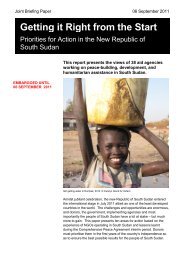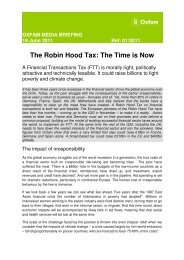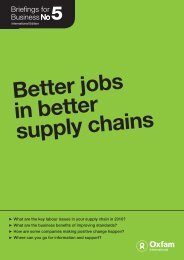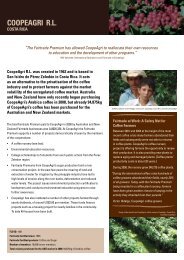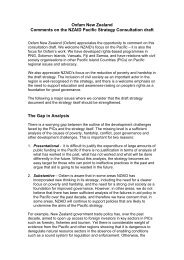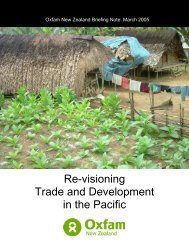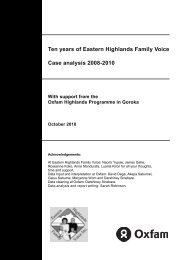Better returns for business.pdf - Oxfam New Zealand
Better returns for business.pdf - Oxfam New Zealand
Better returns for business.pdf - Oxfam New Zealand
- No tags were found...
Create successful ePaper yourself
Turn your PDF publications into a flip-book with our unique Google optimized e-Paper software.
NINE<strong>Oxfam</strong> is a rights-based organization. We believethat investors have an ethical duty to take properaccount of environmental and social issues in theirinvestment processes and practices. 7 This positionis in<strong>for</strong>med both by the practical recognitionthat investors are a major influence in and ofthemselves, and by the premise that underpinsinternational human rights law and conventions– that ‘all organs of society’, including companiesand investors, have obligations to protect andpromote human rights. Within this context, <strong>Oxfam</strong>sees poverty reduction as integral to the deliveryof the most basic human rights.Beyond the moral arguments, we recognizethat there are also compelling financial and<strong>business</strong> reasons <strong>for</strong> investors to be concernedabout poverty and development issues. Theseinclude the potential opportunities presented byemerging markets, the financial risks associatedwith operating or investing in these markets,and the growing social and regulatory pressures<strong>for</strong> investors to take a proactive approachto managing these issues. We review these<strong>business</strong> drivers in more detail here because, inpractice, the level of attention paid by investors topoverty and development issues (and the actionstaken on these issues) is critically dependent onthe nature and intensity of these pressures.THERE ARE COMPELLING FINANCIAL ANDETHICAL REASONS FOR INVESTORS TOBE CONCERNED ABOUT POVERTY ANDDEVELOPMENT ISSUES.First, in relation to the opportunities, investorssee emerging markets in general, and specificsectors within them, as important sources offuture growth and <strong>returns</strong>. 8 The investment caseis rein<strong>for</strong>ced by the structural drivers of growthin these countries. These include growingpopulations, the need <strong>for</strong> significant investmentsin infrastructure and other fixed assets, thegrowth in the size of the ‘middle classes’, andincreases and changes in consumption (e.g.moves from grain to meat-based diets). Thesepressures in turn are driving growing investorinterest in assets such as land and water astheir value and demand rises due toincreasing scarcity.While the opportunities are obvious, so tooare the risks. These include factors such aspopulation growth, the inevitable changes insocial structures that ‘modernisation’ brings,increasing competition <strong>for</strong> natural resourcessuch as agricultural land, <strong>for</strong>ests and water,and the governance and implementation issuesassociated with contributing to sustainableand equitable development. All these presenthuge challenges <strong>for</strong> investors. They may affectinvestors as a consequence of higher costs (e.g.higher costs <strong>for</strong> water and other inputs, higherexpenditures on stakeholder engagement,higher transport costs), increased risk of protestsor conflict (with consequent implications <strong>for</strong><strong>business</strong> continuity and/or the need <strong>for</strong> increasedsecurity), damage to the company’s reputationor to the reputation of its investors, or even tothe loss of the investment (e.g. if a factory oroperation has to shut permanently).Opportunities versus risksThese challenges are particularly wellillustrated in the case of the growing investorinterest in farmland, where water 9 and landrights are frequently integral to the investmentcase. In the BRBW roundtables on access towater and agricultural land (see Box 2), thechanging debate around water – particularlythe emergence of access to water as a humanrights issue – was seen as an issue that couldresult in institutional investors themselves beingexplicitly challenged on their approaches towater management or lack of consultation withlocal communities. Even among those investorsthat proactively engage with companies onthese types of issues, it was recognized that thestandard investor expectation that companiesuse water efficiently is unlikely to be sufficient toaddress the risks associated with conflict overwater resources. It was noted that companiesin sectors that rely heavily on water <strong>for</strong> theirproduction processes (including utilities,



